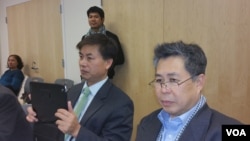A small group of human rights advocates and other Cambodian-Americans met recently in Virginia to discuss Cambodia’s ongoing problems with human rights abuse.
Participants discussed the difficulty in promoting human rights and democracy in Cambodia, where political pressure and powerful individuals often intervene.
Venerable But Buntenh, an activist monk from Cambodia, told the 30-some people gathered monks who advocate for human rights can be accused of fraud and defrocked. Some, including himself, are left with no pagodas, even while land grabs, deforestation and other major rights abuse continue, he said.
But Buntenh said he lost teaching jobs at Preah Sihanouk Raja University and Pannasastra University of Cambodia because of his advocacy work, which included mobilizing supporters to counter land grabs, deforestation and rights abuses.
“I am happy because no pagoda has ties to me,” he said. “With no ties to a pagoda, I can go about joining protests freely.” He mocked monks that are afraid to be involved in protests, saying they will be reborn as geckos in the pagodas.
The discussion was held in honor of International Human Rights Day. But some participants were upset that human rights discussions were intertwined with political discussions. Other participants discussed the importance of politics in the prevention of rights abuses, especially a balance of powers in government.
Tung Yap, president of Cambodian Americans for Human Rights and Democracy, who helped organize the discussion, said his association is apolitical. However, he said, some parties have missions similar to his.
Participant Roeun Veasna said politics and human rights must be discussed together. “When we talk about human rights, we have to consider what else affects them, who else is responsible, and who else is involved, and right now that is the ruling party in Cambodia.”




